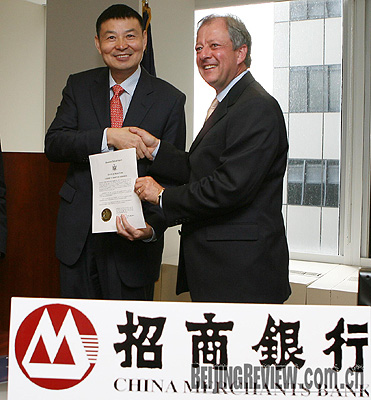| Numbers of the Week
300,000
The number of people whose assets exceeded 10 million yuan ($1.46 million) reached approximately 300,000 in 2008 in China.
5 years
Foreign strategic investors must commit to a five-year lockup period when they acquire stakes in Chinese banks.

TO THE POINT: While the stock markets regain their momentum this year, China's securities regulators have issued new rules for public listings of start-up enterprises. Chinese fund management firms had their most difficult year on record in 2008, losing a total of 1.5 trillion yuan ($219 billion) because of the meltdowns in the domestic stock markets. The country's central bank is sticking to its appropriately accommodative monetary policy by refraining from withdrawing cash from the open market and issuing fewer central bank bills. The Export-Import Bank of China and the Inter-American Development Bank signed a trade financing agreement to boost bilateral trade. Wuhan Iron and Steel secured a deal to purchase a 19.9-percent stake in a Canadian miner. Chinese financial institutions now are allowed to borrow more foreign money to finance their trading activities.
By LIU YUNYUN
Start-up Board
The China Securities Regulatory Commission (CSRC) published the listing rules for initial public offerings of innovative start-up companies on the Nasdaq-style Growth Enterprise Market (GEM).
The rules, which will go into effect on May 1, were announced after 11 years of deliberation.
Listing candidates must have an operating history of at least three years, a minimum of 10 million yuan ($1.46 million) net profit in the past two years or 5 million yuan ($732,000) in the past year, and net assets of at least 20 million yuan ($2.9 million).
Currently, the country's other stock exchanges in Shanghai and Shenzhen are committed to relatively mature blue-chip companies and small and medium-sized enterprises with sound performances.
Yao Gang, Deputy Director of CSRC, told China Securities Journal that the GEM and the other stock exchanges are complementary.
"If the companies listed on the GEM demonstrate superior profitability and high growth potential, they can jump to the main boards," he said.
Yao also said regulators could officially launch the GEM after August, so that they would have more time to perfect the system.
Fund Performance
The devastating global financial crisis took its toll on Chinese fund performances last year, resulting in a total loss of 1.5 trillion yuan ($219 billion).
A research report issued by TX Investment Consulting Co. Ltd. indicated that domestic equity funds suffered the biggest losses of up to 974 billion yuan ($143 billion), accounting for 65 percent of total losses.
Qualified domestic institutional investor (QDII) funds, which invest in overseas companies, also encountered problems. TX Consulting said they lost 50.5 billion yuan ($7.4 billion) last year. Some QDIIs saw their values plunge 70 percent in 2008.
There was still good news, though, with bond funds stealing the show in 2008 and reaping 9.26 billion yuan ($1.35 billion), according to the report.
TX Investment suggests that investors diversify their portfolios during times of financial turmoil by combining risk-averse products with potentially high-yield products such as equity funds.
This year, fund performances have started to gain momentum because the Chinese economy is expected to be the first to recover from the effects of the current global economic crisis. For example, the value of the Industrial Trend Investment Mixed Type Fund, which invests in companies with high returns, has risen about 23 percent so far this year.
Going Overseas
Coming on the heals of the Chinalco and Minmetals deals, another Chinese company has joined the overseas investment spree.
Wuhan Iron and Steel (Group) Corp. (WISCO), a major steelmaker based in central Hubei Province, has agreed to pay $240 million for a 19.9-percent stake in the Canadian miner Consolidated Thompson Iron Mines Ltd. (Thompson), according to a recent report in Shanghai Daily.
Under the deal, WISCO also will purchase a no less than 25-percent stake in the subsidiary of Consolidated Thompson that is responsible for developing the Bloom Lake mine. The mine is one of the Canadian miner's largest and most cost-efficient projects.
| 